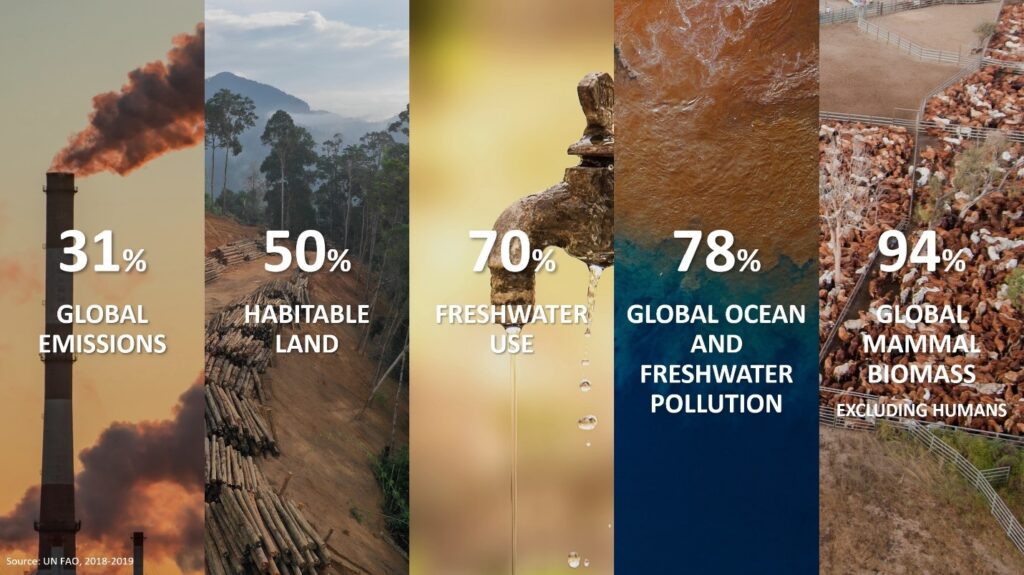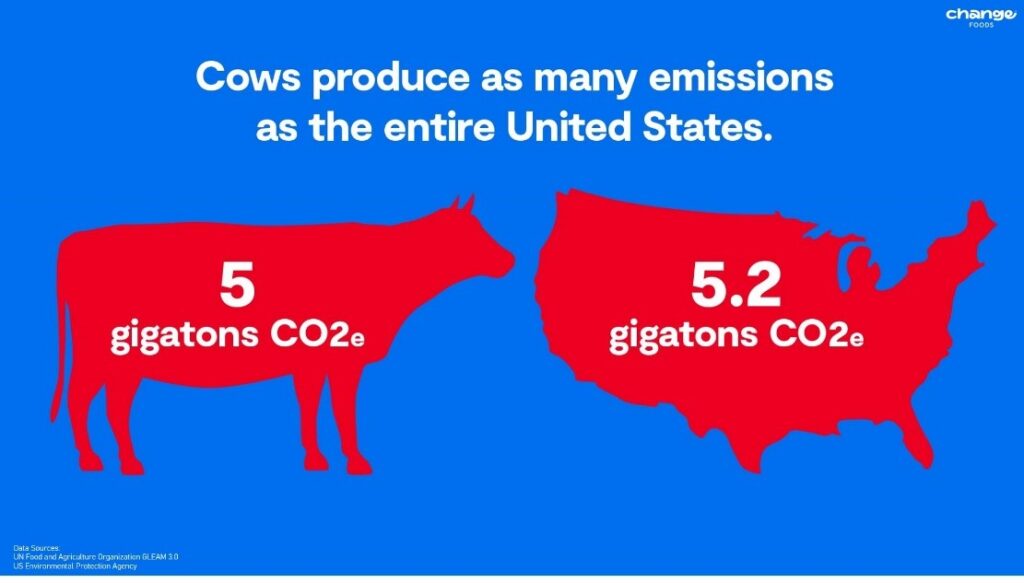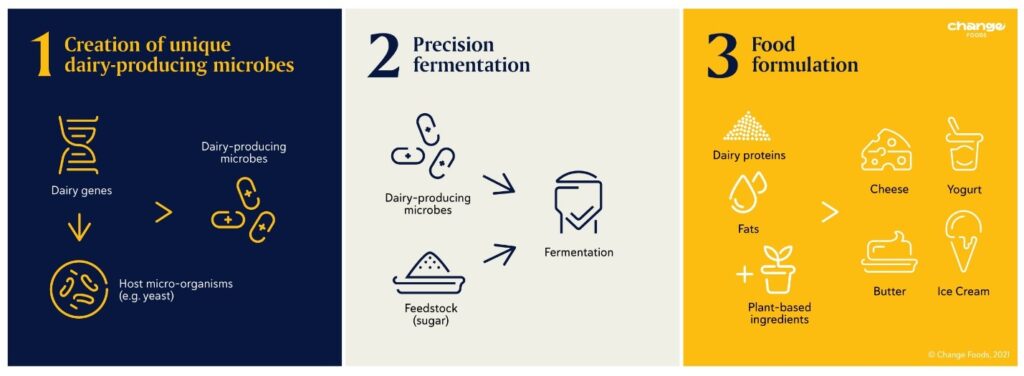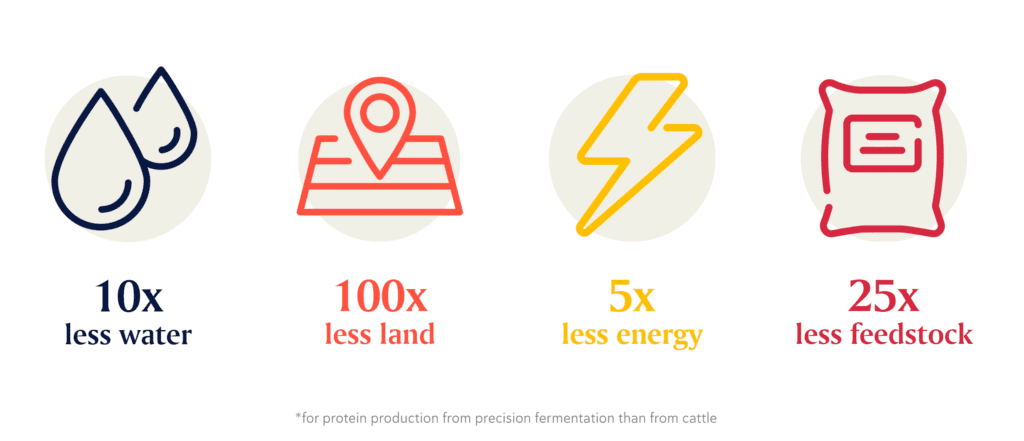Decarbonizing Food: Precision Fermentation as the Next Frontier in Climate Technology
The way we feed the world today is unsustainable. Our food system is responsible for one third of global greenhouse gas emissions, is the largest user of land and freshwater resources, and is the leading driver of ocean and freshwater pollution, biodiversity loss, and deforestation.


Livestock farming is by far the biggest contributor to the food sustainability crisis. It is the leading source of anthropogenic methane emissions ahead of oil and gas, coal, and landfills.
Not only are the emissions incredibly high, but the land required to farm cattle is also massive. Today, we use about 1/3 of all ice-free land on Earth to graze livestock and grow crops to feed them, which is driving deforestation and biodiversity loss in places like the Amazon. And, of course, water has become a big area of focus with many parts of the world struggling with increasing water scarcity and drought.
If cows were a country (we farm about 1.5 billion of them globally), their emissions alone would rival the United States! This is significant. And, unfortunately, global appetite for meat and dairy products such as milk and cheese continues to rise.

The science is clear. We cannot continue to rely on animal agriculture to feed the growing population and meet our sustainability goals. In fact, we need to rewild and reforest large parts of our planet to restore biodiversity and reduce pressure on natural ecosystems. In order to do so, we must scale back industrialized animal agriculture and replace animal-based foods with less resource intensive, nutritious, and tasty alternatives.
The problem is that people love eating meat and dairy, and convincing them to limit their animal food intake has not been successful. In fact, global demand for animal products is projected to increase 40% by 2050!

This is where precision fermentation comes in. Precision fermentation allows us to create animal-free foods that match the taste, texture, and nutrition of their animal-based counterparts, but with a much lighter environmental footprint.
Let’s look at dairy for example. Milk serves as the key ingredient for some of the world’s most beloved foods such as cheese, yogurt, and ice cream. Producing these foods is incredibly resource intensive and polluting. Precision fermentation allows us to offer the same foods, but made in a different way.
In its essence precision fermentation uses microorganisms as tiny factories to make specific ingredients, like milk proteins instead of animals. It’s a combination of age-old fermentation techniques that we use to make foods such as beer and kimchi, with cutting edge biotechnology.
The precision fermentation process starts by encoding microorganisms, such as yeast or fungi, with a dairy milk protein DNA taken from a digital database, to create unique milk-making microbes. Once these new microbes are created, they are placed in giant fermentation tanks similar to those used to brew beer. Sugar and other nutrients are added to start the fermentation process, during which the special microbes make milk proteins. So, essentially, instead of brewing beer, we can brew dairy. Once the fermentation process is complete, the milk proteins are harvested by filtering them from the fermentation broth, creating a milk protein powder concentrate. It looks just like the whey protein powder one can buy at any health food store. Because the microbes were coded with the exact DNA sequence from a dairy cow, the milk proteins are molecularly identical to those made by a cow, but without any cows involved at all. In essence, we are changing the process, but not the food.

The biggest benefit of producing key proteins without farming animals is environmental. By skipping animals, we can dramatically reduce the resources needed to produce the same basic ingredients. For example, milk proteins produced via precision fermentation require up to 10 times less water, 100 times less land, 5 times less energy and 25 times less feedstock, compared to the same proteins from cows.

We are on the cusp of the next era in food. Much like the agricultural revolution allowed humanity to move away from the daily struggle to ensure adequate food supply, the next wave of technological revolution will help us address the climate crisis, provide food security, and boost nutrition availability.
Precision fermentation could allow us to return large parts of the most critical ecosystems to nature, while freeing up land to scale regenerative and organic agriculture. By reducing demand for water, we can supply critical drinking water needs, as well as rebalance the water equation in drought-stricken regions and replenish aquifers. By decoupling food from land-based animal agriculture, we can provide food security for many resource-constrained regions and decrease conflict. Finally, by developing and deploying new food technologies, we can unlock new economic growth opportunities.
The exciting part is that we are no longer limited by the past. Replicating the traditional foods that we know and love is just the beginning. Tomorrow, we will be able to create new, more nutritious foods. We can explore new flavors and new food experiences. We can connect to different cultures in unique ways by offering a diverse array of products. Ultimately, we can help create a food system that is thriving, sustainable, and kind.
By Irina Gerry is the Chief Marketing Officer at Change Foods, a precision fermentation food tech company creating animal-free dairy products. She is a purpose-driven entrepreneur and marketing leader on a mission to transform the food system and drive widespread adoption of sustainable ways to feed the world.

